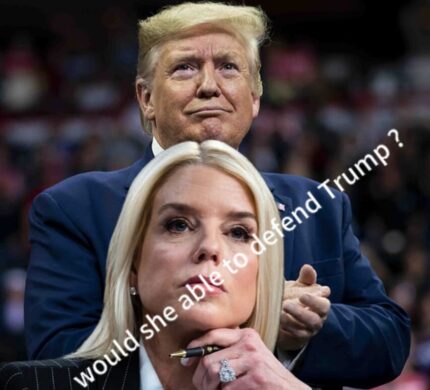President Donald Trump’s cabinet nominees have gained momentum in the Senate, with Pam Bondi confirmed as Attorney General, while Robert F. Kennedy Jr. and Tulsi Gabbard cleared crucial committee hurdles. Bondi’s confirmation marks a significant milestone in Trump’s push to reshape the Department of Justice, while Kennedy and Gabbard now await a full Senate vote that could finalize their roles in the administration.
Pam Bondi Confirmed as U.S. Attorney General
The U.S. Senate voted 54-46 to confirm Pam Bondi as the nation’s next attorney general, placing her in charge of the Department of Justice. All Republican senators backed her nomination, with only one Democrat, Senator John Fetterman of Pennsylvania, crossing party lines to vote in favor. The confirmation secures Bondi’s place as the chief law enforcement officer of the United States and a key figure in Trump’s administration.
Bondi, a longtime ally of Trump, has been a vocal critic of the criminal cases against him and has pledged to reverse what Trump has called the “weaponization” of the Justice Department. A former Florida attorney general, she gained national attention for her efforts against opioid abuse and human trafficking. Trump, in announcing her nomination, stated that she would work to restore trust in the Justice Department and ensure fairness in prosecutions. Her appointment is expected to bring significant changes, especially regarding investigations involving Trump and his associates.
Kennedy’s Nomination Advances Despite Vaccine Controversy
Robert F. Kennedy Jr., Trump’s pick for Secretary of Health and Human Services, passed a key Senate Finance Committee vote by a narrow 14-13 margin, strictly along party lines. Kennedy, an environmental lawyer and prominent critic of U.S. healthcare policies, has faced bipartisan skepticism, particularly regarding his stance on vaccines. Democrats have raised concerns about his past statements, including claims that “there’s no vaccine that is safe and effective.”
During his confirmation hearings, Kennedy attempted to downplay his previous remarks, insisting that he supports rigorous safety testing rather than outright opposition to vaccines. His critics, however, highlighted his leadership at Children’s Health Defense, an organization known for promoting vaccine skepticism. Despite pushback, Kennedy secured the crucial support of Republican Senator Bill Cassidy of Louisiana, a physician who had initially expressed doubts. Cassidy later announced his endorsement after receiving what he described as “serious commitments” from Kennedy and the White House. The full Senate will now decide Kennedy’s fate, with Republicans holding a 53-47 majority.
Skeptical Republicans Do Not Block Gabbard
Tulsi Gabbard, the nominee for Director of National Intelligence, narrowly passed a Senate Intelligence Committee vote, 9-8, along party lines. Gabbard’s nomination has been met with resistance from both parties due to her past foreign policy positions, particularly her 2017 meeting with Syrian President Bashar al-Assad and her support for a pardon of whistleblower Edward Snowden.
Democratic senators grilled Gabbard on her views regarding Russia’s invasion of Ukraine, with Senator Michael Bennet accusing her of sympathizing with Moscow. Gabbard defended herself by emphasizing her commitment to U.S. national security, stating that while she opposes unnecessary wars, she would work to counter America’s adversaries. Despite initial hesitation, Republican Senators Susan Collins and Todd Young ultimately backed her, citing assurances that she would prioritize intelligence reforms and safeguard classified information. If confirmed by the full Senate, Gabbard will oversee 18 intelligence agencies and manage a budget exceeding $70 billion.
Trump’s Cabinet Reshaping Gains Momentum
With Bondi’s confirmation and the advancement of Kennedy and Gabbard, Trump’s administration is moving closer to finalizing key leadership positions. The Republican-controlled Senate is expected to hold full votes on Kennedy and Gabbard’s nominations in the coming days, setting the stage for a reshaped cabinet aligned with Trump’s policy vision.
Trump’s selections reflect his broader agenda of challenging traditional government institutions and reshuffling leadership in critical agencies. Bondi’s Justice Department is likely to take a more aggressive stance against what Trump calls “politicized” investigations, while Kennedy’s leadership at Health and Human Services could bring radical shifts in healthcare policy. Meanwhile, Gabbard’s appointment as intelligence chief signals Trump’s intent to overhaul the intelligence community, which he has frequently clashed with.
As Senate Republicans prepare for final confirmation votes, all eyes are on whether Kennedy and Gabbard can secure enough support. Their potential confirmations would mark a significant step in Trump’s efforts to mold his administration to reflect his priorities.














